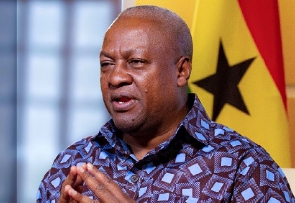John Dramani Mahama conducted a press conference on Sunday, July 7, to elaborate on his vision and strategies for Ghana if he is re-elected to the presidency. Although numerous observers believed that he effectively communicated his stance, a thorough examination of his promises reveals a significant discrepancy in comparison to his previous performance.
The economy that John Mahama inherited from the late Prof. Mills was characterized by a remarkable growth rate of 14% and was built on a robust foundation. Nevertheless, the growth rate experienced a substantial decline during his tenure, declining to approximately 3.24% by the time he vacated office.
This underscores a period of unsatisfactory and incompetent economic management. The severe energy crisis that prevailed during his tenure had a profound impact on both businesses and daily life, resulting in prolonged and debilitating power outages that lasted for two years.
Additionally, Mahama's administration was subjected to a plethora of corruption allegations, which became a prevalent topic in national discourse, frequently dominating radio and television discussions. One of Mahama's controversial decisions was to request assistance from the International Monetary Fund (IMF), a decision that many critics contend was avoidable. Furthermore, the three-month pay policy, which primarily impacted teachers, resulted in numerous employees receiving only three months' salary, despite having worked for more than a year.
The free senior high school (SHS) policy of Akuffo Addo was also vehemently criticized by the National Democratic Congress (NDC) under Mahama, who characterized it as unsustainable and whimsical. In response, Mahama hastily implemented a 'progressively free education' scheme and initiated the construction of 200 E-blocks. This initiative, however, proved unsustainable, with fewer than 20 E-blocks completed by 2016, and the progressively free education policy stalling as the NDC diverted resources to media campaigns against Akuffo Addo’s vision of free SHS.
Mahama's recent press conference has prompted substantial questions. He failed to substantively reference his track record during the three-hour session while speaking as though his previous stewardship was nonexistent. He frequently provided imprecise and unsatisfactory responses to critical economic probes. For instance, his response was below expectations when asked about strategies for stabilizing the exchange rate.
In the same vein, Captain Smart's direct question regarding what he [Mahama] will do differently resulted in a vague response regarding a "24-hour economy." In 2016, he vehemently opposed the idea of free SHS, dismissing it as a foolhardy promise by a desperate politician. However, he now claims credit for its implementation, which portrays him as disingenuous.
Additionally, Mahama's commitment to combat corruption through the prosecution of corrupt officials is hollow, as his administration has a history of widespread corruption that has been described by a Supreme Court justice as "create, loot, and share." His assertion that four years is insufficient to complete projects, in contrast to his request for an additional four-year term, demonstrates a fundamental inconsistency in his conviction and raises concerns about his sincerity and desperation for power.
Mahama's candidacy presents potential risks, considering his recent pronouncements and his track record. His previous term was marked by widespread corruption, energy crises, and economic decline. The electorate must conduct a critical evaluation of his promises and consider the potential consequences of his return to power, as it has the potential to exacerbate the country's economic challenges and further exacerbate instability. Ghanaians must maintain a high level of alertness and conduct a comprehensive examination of Mahama's candidacy to ensure that the lessons of his previous governance are not disregarded.
Opinions of Friday, 12 July 2024
Columnist: Isaac Ofori



















